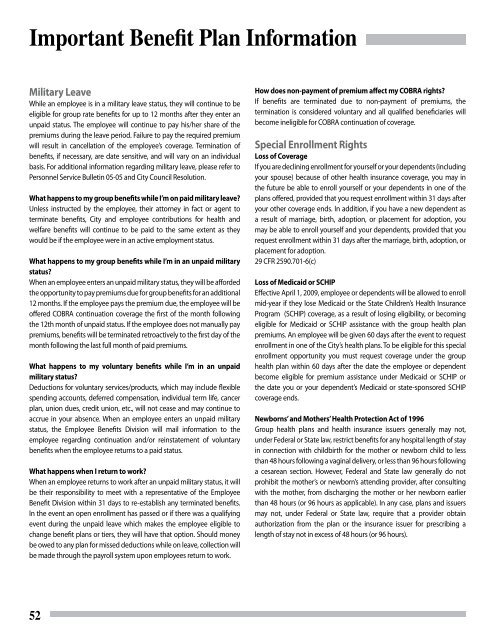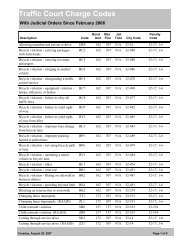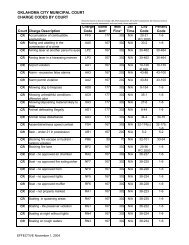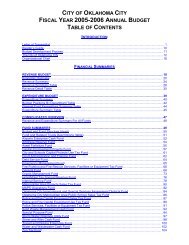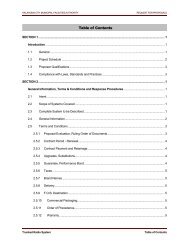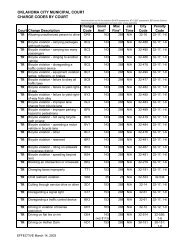Employee Benefit Guide 2012 - City of Oklahoma City
Employee Benefit Guide 2012 - City of Oklahoma City
Employee Benefit Guide 2012 - City of Oklahoma City
You also want an ePaper? Increase the reach of your titles
YUMPU automatically turns print PDFs into web optimized ePapers that Google loves.
Important <strong>Benefit</strong> Plan Information<br />
Military Leave<br />
While an employee is in a military leave status, they will continue to be<br />
eligible for group rate benefits for up to 12 months after they enter an<br />
unpaid status. The employee will continue to pay his/her share <strong>of</strong> the<br />
premiums during the leave period. Failure to pay the required premium<br />
will result in cancellation <strong>of</strong> the employee’s coverage. Termination <strong>of</strong><br />
benefits, if necessary, are date sensitive, and will vary on an individual<br />
basis. For additional information regarding military leave, please refer to<br />
Personnel Service Bulletin 05-05 and <strong>City</strong> Council Resolution.<br />
What happens to my group benefits while I’m on paid military leave?<br />
Unless instructed by the employee, their attorney in fact or agent to<br />
terminate benefits, <strong>City</strong> and employee contributions for health and<br />
welfare benefits will continue to be paid to the same extent as they<br />
would be if the employee were in an active employment status.<br />
What happens to my group benefits while I’m in an unpaid military<br />
status?<br />
When an employee enters an unpaid military status, they will be afforded<br />
the opportunity to pay premiums due for group benefits for an additional<br />
12 months. If the employee pays the premium due, the employee will be<br />
<strong>of</strong>fered COBRA continuation coverage the first <strong>of</strong> the month following<br />
the 12th month <strong>of</strong> unpaid status. If the employee does not manually pay<br />
premiums, benefits will be terminated retroactively to the first day <strong>of</strong> the<br />
month following the last full month <strong>of</strong> paid premiums.<br />
What happens to my voluntary benefits while I’m in an unpaid<br />
military status?<br />
Deductions for voluntary services/products, which may include flexible<br />
spending accounts, deferred compensation, individual term life, cancer<br />
plan, union dues, credit union, etc., will not cease and may continue to<br />
accrue in your absence. When an employee enters an unpaid military<br />
status, the <strong>Employee</strong> <strong>Benefit</strong>s Division will mail information to the<br />
employee regarding continuation and/or reinstatement <strong>of</strong> voluntary<br />
benefits when the employee returns to a paid status.<br />
What happens when I return to work?<br />
When an employee returns to work after an unpaid military status, it will<br />
be their responsibility to meet with a representative <strong>of</strong> the <strong>Employee</strong><br />
<strong>Benefit</strong> Division within 31 days to re-establish any terminated benefits.<br />
In the event an open enrollment has passed or if there was a qualifying<br />
event during the unpaid leave which makes the employee eligible to<br />
change benefit plans or tiers, they will have that option. Should money<br />
be owed to any plan for missed deductions while on leave, collection will<br />
be made through the payroll system upon employees return to work.<br />
How does non-payment <strong>of</strong> premium affect my COBRA rights?<br />
If benefits are terminated due to non-payment <strong>of</strong> premiums, the<br />
termination is considered voluntary and all qualified beneficiaries will<br />
become ineligible for COBRA continuation <strong>of</strong> coverage.<br />
Special Enrollment Rights<br />
Loss <strong>of</strong> Coverage<br />
If you are declining enrollment for yourself or your dependents (including<br />
your spouse) because <strong>of</strong> other health insurance coverage, you may in<br />
the future be able to enroll yourself or your dependents in one <strong>of</strong> the<br />
plans <strong>of</strong>fered, provided that you request enrollment within 31 days after<br />
your other coverage ends. In addition, if you have a new dependent as<br />
a result <strong>of</strong> marriage, birth, adoption, or placement for adoption, you<br />
may be able to enroll yourself and your dependents, provided that you<br />
request enrollment within 31 days after the marriage, birth, adoption, or<br />
placement for adoption.<br />
29 CFR 2590.701-6(c)<br />
Loss <strong>of</strong> Medicaid or SCHIP<br />
Effective April 1, 2009, employee or dependents will be allowed to enroll<br />
mid-year if they lose Medicaid or the State Children’s Health Insurance<br />
Program (SCHIP) coverage, as a result <strong>of</strong> losing eligibility, or becoming<br />
eligible for Medicaid or SCHIP assistance with the group health plan<br />
premiums. An employee will be given 60 days after the event to request<br />
enrollment in one <strong>of</strong> the <strong>City</strong>’s health plans. To be eligible for this special<br />
enrollment opportunity you must request coverage under the group<br />
health plan within 60 days after the date the employee or dependent<br />
become eligible for premium assistance under Medicaid or SCHIP or<br />
the date you or your dependent’s Medicaid or state-sponsored SCHIP<br />
coverage ends.<br />
Newborns’ and Mothers’ Health Protection Act <strong>of</strong> 1996<br />
Group health plans and health insurance issuers generally may not,<br />
under Federal or State law, restrict benefits for any hospital length <strong>of</strong> stay<br />
in connection with childbirth for the mother or newborn child to less<br />
than 48 hours following a vaginal delivery, or less than 96 hours following<br />
a cesarean section. However, Federal and State law generally do not<br />
prohibit the mother’s or newborn’s attending provider, after consulting<br />
with the mother, from discharging the mother or her newborn earlier<br />
than 48 hours (or 96 hours as applicable). In any case, plans and issuers<br />
may not, under Federal or State law, require that a provider obtain<br />
authorization from the plan or the insurance issuer for prescribing a<br />
length <strong>of</strong> stay not in excess <strong>of</strong> 48 hours (or 96 hours).<br />
52


